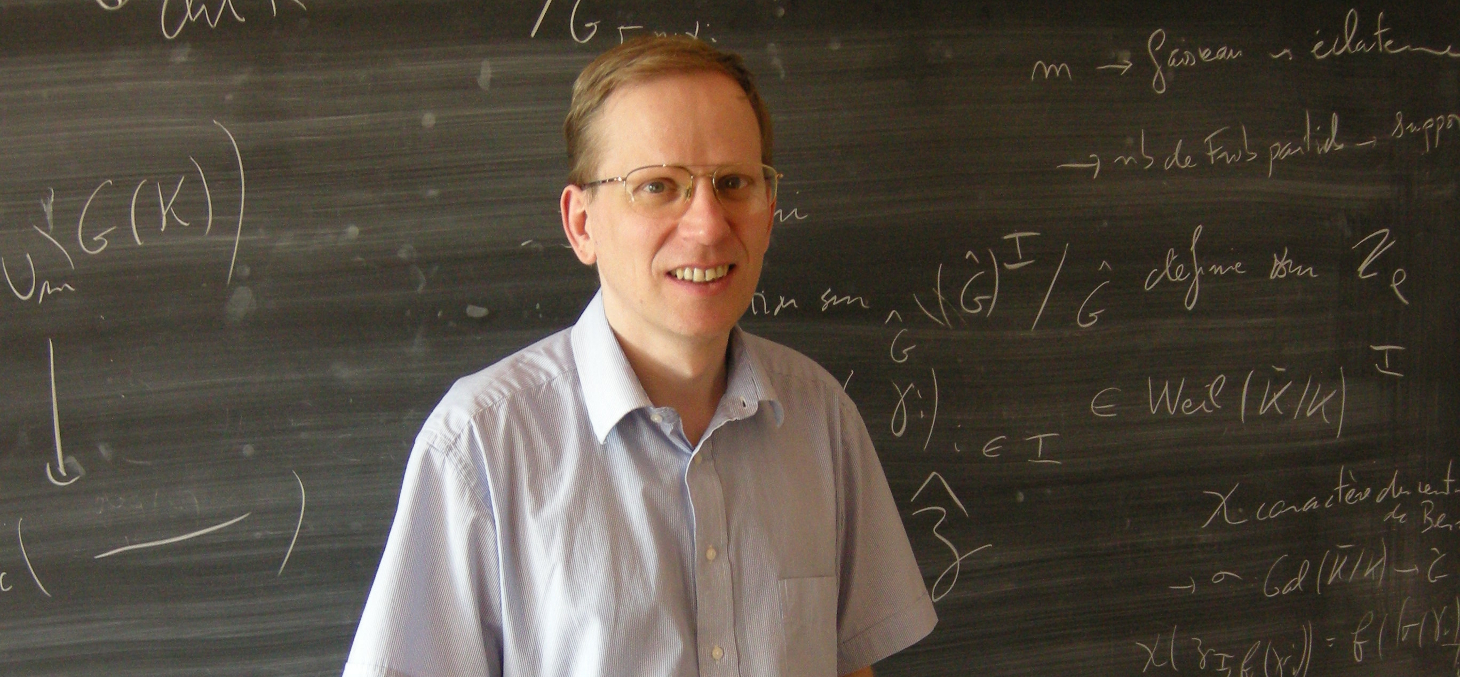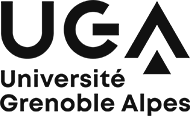Vincent Lafforgue, winner of the breakthrough prize in mathematics
Accolade/Award
Research

Mathematician Vincent Lafforgue, a research director at the Institut Fourier, has won the Breakthrough Prize in the Mathematics category. This distinction rewards his career as a mathematician and especially his research on the Langlands program.
The Breakthrough prizes were founded in 2012 and 2013 by some of the world’s leading entrepreneurs such as Yuri Milner, Julia Milner, Sergey Brin, Anne Wojcicki, Mark Zuckerberg, Priscilla Chan, Jack Ma, and Pony Ma, and aim to celebrate scientific research and inspire the next generation of scientists. Every year, three prizes reward research in Fundamental Physics, Life Sciences and Mathematics. This year, the Breakthrough Prize in Mathematics went to French CNRS researcher Vincent Lafforgue. It is the fifth time that a French scientist has received the accolade.
On entering the École Normale Supérieure in Paris (ENS), Vincent Lafforgue chose the Baum-Connes conjecture as the subject for his thesis, under the supervision of Jean-Benoît Bost. During his research, he introduced original Banach algebra techniques to solve new cases of the conjuncture. In 1999, he was recruited by the CNRS Institute of Mathematics of Jussieu [1], where he succeeded, after several years’ work, in demonstrating the conjecture with coefficients for a whole new series of cases, or "hyperbolic groups" as introduced by Gromov.
The mathematician then decided it was time to move on from Baum-Connes to a new subject. “When you try to solve a difficult problem, nine times out of ten you will fail. You have to be able to change focus and move on to a new topic” – a freedom that the current research director at the Institut Fourier says he owes to the CNRS. “A permanent position allows a researcher to enjoy true peace of mind. Our research and projects are difficult and it can take up to ten years before we get significant results. What’s more, we can’t predict what we are going to find.”
For more than ten years, Vincent Lafforgue dedicated his research to algebraic geometry and especially to what mathematicians call the “Langlands program”, a vast series of conjectures in arithmetic. His efforts were rewarded five years ago when his work on “global fields of positive characteristics”, as he calls them for the specialists, made a significant contribution to the program. These achievements earned him the CNRS silver medal in 2015. He then continued this research in collaboration with Alain Genestier. Last August in Rio, he was one of the many French scientists to take the floor at the International Congress of Mathematicians, an event held every four years and during which the prestigious Fields medals are awarded.
The research director at the Institut Fourier [2] is now looking into operator algebras for quantum mechanics in the hope of finding new materials for green energy. After reading about the current ecological crisis, and especially its economic aspects, he decided to embark on new research in this field. “Economists say there is global underinvestment in clean energy and ecology. I might point out, however, that this research is highly developed at the CNRS. That convinced me to get started. I want to try and make my contribution to it."
Vincent Lafforgue will receive his prize on November 4 during the 2018 Breakthrough Prize ceremony, which aims to inspire the next generation of scientists and initiate a dialogue between science and society. “While applied science does not lack support, fundamental science is very fragile and requires the backing of governments worldwide. Public recognition and understanding of what scientists actually do is essential to secure this support,” Yuri Milner said in an interview with Bloomberg Technology.
This is why the awards ceremony seeks in some ways to be the “Oscars of Science” by drawing inspiration from the famous Academy Awards ceremony: the winners receive their prizes during a televised celebration bringing together prestigious guests at NASA’s Ames Research Center at the heart of Silicon Valley.
The founders of the Breakthrough Prize also want to encourage children into science. An idea shared by Vincent Lafforgue, who thinks that youngsters should be allowed to cultivate their abilities and taste for science. “It’s very important to start doing mathematics at a young age. I really enjoyed my math classes at school, especially mental arithmetic, then geometry and more complex arithmetic. Extracurricular activities played an important role in my childhood too. I would read books written by mathematicians for children and teenagers,” he adds.
On entering the École Normale Supérieure in Paris (ENS), Vincent Lafforgue chose the Baum-Connes conjecture as the subject for his thesis, under the supervision of Jean-Benoît Bost. During his research, he introduced original Banach algebra techniques to solve new cases of the conjuncture. In 1999, he was recruited by the CNRS Institute of Mathematics of Jussieu [1], where he succeeded, after several years’ work, in demonstrating the conjecture with coefficients for a whole new series of cases, or "hyperbolic groups" as introduced by Gromov.
The mathematician then decided it was time to move on from Baum-Connes to a new subject. “When you try to solve a difficult problem, nine times out of ten you will fail. You have to be able to change focus and move on to a new topic” – a freedom that the current research director at the Institut Fourier says he owes to the CNRS. “A permanent position allows a researcher to enjoy true peace of mind. Our research and projects are difficult and it can take up to ten years before we get significant results. What’s more, we can’t predict what we are going to find.”
For more than ten years, Vincent Lafforgue dedicated his research to algebraic geometry and especially to what mathematicians call the “Langlands program”, a vast series of conjectures in arithmetic. His efforts were rewarded five years ago when his work on “global fields of positive characteristics”, as he calls them for the specialists, made a significant contribution to the program. These achievements earned him the CNRS silver medal in 2015. He then continued this research in collaboration with Alain Genestier. Last August in Rio, he was one of the many French scientists to take the floor at the International Congress of Mathematicians, an event held every four years and during which the prestigious Fields medals are awarded.
The research director at the Institut Fourier [2] is now looking into operator algebras for quantum mechanics in the hope of finding new materials for green energy. After reading about the current ecological crisis, and especially its economic aspects, he decided to embark on new research in this field. “Economists say there is global underinvestment in clean energy and ecology. I might point out, however, that this research is highly developed at the CNRS. That convinced me to get started. I want to try and make my contribution to it."
Vincent Lafforgue will receive his prize on November 4 during the 2018 Breakthrough Prize ceremony, which aims to inspire the next generation of scientists and initiate a dialogue between science and society. “While applied science does not lack support, fundamental science is very fragile and requires the backing of governments worldwide. Public recognition and understanding of what scientists actually do is essential to secure this support,” Yuri Milner said in an interview with Bloomberg Technology.
This is why the awards ceremony seeks in some ways to be the “Oscars of Science” by drawing inspiration from the famous Academy Awards ceremony: the winners receive their prizes during a televised celebration bringing together prestigious guests at NASA’s Ames Research Center at the heart of Silicon Valley.
The founders of the Breakthrough Prize also want to encourage children into science. An idea shared by Vincent Lafforgue, who thinks that youngsters should be allowed to cultivate their abilities and taste for science. “It’s very important to start doing mathematics at a young age. I really enjoyed my math classes at school, especially mental arithmetic, then geometry and more complex arithmetic. Extracurricular activities played an important role in my childhood too. I would read books written by mathematicians for children and teenagers,” he adds.
Notes
- Institut de Mathématiques de Jussieu (CNRS / Université Paris Diderot / Sorbonne Université)
- Institut Fourier (CNRS / Université Grenoble Alpes)
Published on February 8, 2021
Updated on February 8, 2021
Updated on February 8, 2021
Contact
Our laureate in the news
Université Grenoble Alpes
International and External Affairs
Tour Irma
51 rue des Mathématiques
38610 Gières - France
dgddit@univ-grenoble-alpes.fr
International and External Affairs
Tour Irma
51 rue des Mathématiques
38610 Gières - France
dgddit@univ-grenoble-alpes.fr
- News
- Resources
- Contacts
- How to find us
- Legal notices
- Personal data
- Credits
- Website map
- Cookies
- Website accessibility: not compliant
You are
You wish
Submit
Share the link
Copy
Copied
Close the modal window
Share the URL of this page
I recommend:
Consultable at this address:
La page sera alors accessible depuis votre menu "Mes favoris".
Stop video
Play video
Mute
Play audio
Chat: A question?
Chatbot Robo Fabrica
Matomo traffic statistics
X (formerly Twitter)

